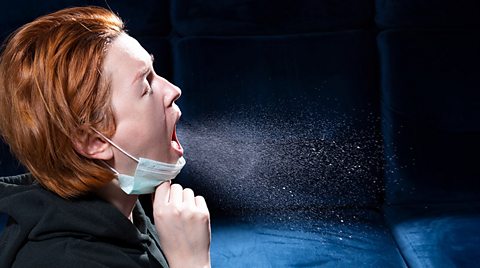Key points
- Antibiotics are medicines which kill bacterial infections.
- Vaccines protect us against viral infections.
Video
Learn how antibiotics and vaccines can help keep you healthy
Oh, I hate being ill.
Fortunately, antibiotics and vaccines can help keep us healthy. Antibiotics help when you have a bacterial infection like pneumonia. Some antibiotics break down the external layer of the bacteria. Some block the bacteria's reproduction so they die without multiplying and others stop the bacteria's internal processes and they do all of this without harming your own cells. But since bacteria reproduce so quickly, sometimes they evolve to develop resistance faster than the antibiotics can stop them.
Vaccines are a bit different. We take them before getting ill to prevent infections. Vaccines expose your body to weakened or dead components of a pathogen, either a virus or bacteria. This weaker version of the pathogen stimulates white blood cells to produce the correct antibodies, but without risk of an infection. After making them once your body gets very efficient at producing the antibodies and can better fight off the real pathogen, or at least prevent it from making you so ill.
So that's how vaccines and antibiotics can help you do away with the duvet. If I do say so myself.
Can you answer these questions based on the video?
1. What types of microorganism causes pneumonia?
2. When are vaccines taken?
Bacteria.
Before getting the illness.
Antibiotics
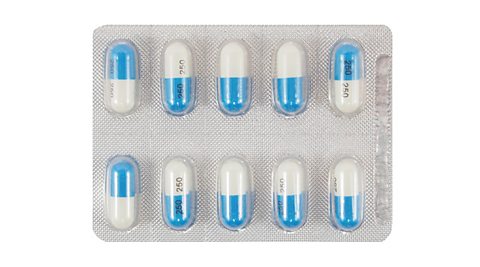
Drugs are substances that have an effect on the body. medicinesDrugs that help people suffering from medical conditions, which are usually prescribed by a doctor., like antibiotics, are drugs that help treat people suffering from pain or disease. Not all drugs are medicines.
Antibiotics only treat bacterial infections, including those shown in the table.
| Illness | Symptoms |
|---|---|
| Pneumonia | Coughing, difficulty breathing, increased heartbeat and temperature, sweating and shivering, and chest pain. |
| Cholera | Severe diarrhoea. |
| Tetanus | Stiffness in jaw (lockjaw), muscle spasms, increased heartbeat and temperature, sweating. |
| Gonorrhoea (an STISexually-Transmitted Infection. An infection spread during sex.) | Thick green or yellow discharge from the vagina or penis, pain when urinating. |

Different antibiotics work in different ways:
- Some kill bacteria by breaking down their outside layer.
- Some stop bacteria from reproducing so they can't spread.
- Some can stop the chemical processes happening inside bacteria.
Antibiotics have saved millions of lives and continue to do so today. Their discovery changed the world of medicine.
Antibiotics have no effect on viral infections like the common cold or flu.
Discovery of antibiotics
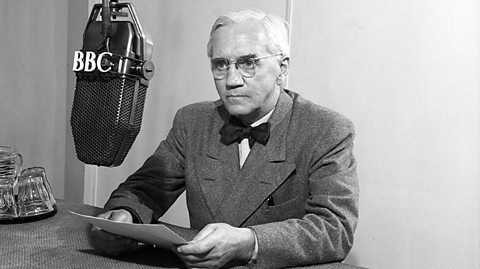
Sir Alexander Fleming (1881-1955) was a Scottish scientist who discovered the antibiotic; penicillin.
In 1928 Fleming was working on bacteria which he grew on agar plates. He returned to work from a holiday and noticed that one of the plates was infected with a fungus. He noticed that the bacteria did not grow near the fungus. He then found that the fungus naturally produced a substance to defend itself against bacterial infection. He isolated this and named it penicillin after the fungus.
He won the Nobel PrizeAn important award for outstanding work in physics, chemistry, physiology/medicine, literature, economics or peace. for this achievement.

Antibiotic resistance
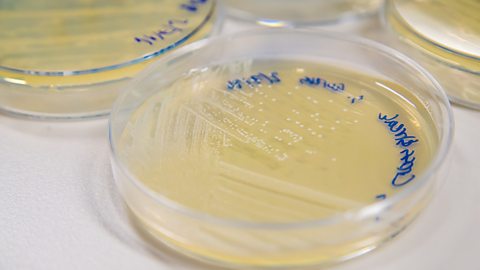
After his discovery, Fleming noticed that bacteria were more likely to survive if too little penicillin was used or it was used for only a short period. This antibiotic-resistance occurs because bacteria, like all life, are evolutionThe theory proposed by Charles Darwin in which small advantages in organisms mean they are more likely to reproduce and pass these to their offspring. Over many, many generations this natural selection causes the development of new species by evolution. .
Scientists are working on developing new antibiotics, but it is a long and expensive process. Immediately after each new antibiotic is discovered, there is very little resistance. But as the new antibiotic is widely used, bacteria have more opportunities to evolve and develop resistance. Not all bacteria are killed if antibiotics are prescribed in a dose that is too low or for not long enough.
Some scientists are worried that the evolution of antibiotic resistance is happening faster than we are able to discover new antibiotics. This could mean that bacterial infections that are easy to cure now might be untreatable in the future.

Vaccines
Vaccines are medicines which mainly prevent viral infections. Giving someone a vaccine is called vaccination. Vaccines have been developed for many viral infections.
| Illness | Symptoms |
|---|---|
| Flu | High temperature, aches, dry cough and sore throat |
| Chickenpox | A rash with blisters that turn into scabs |
| Measles | Blocked or runny nose, sneezes, sore eyes, raised temperature |
| Covid-19 | High temperature, cough, loss or change to sense of taste and smell |
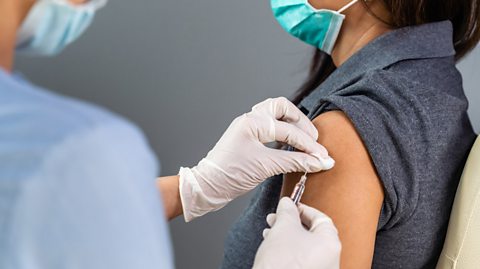
Some vaccines are effective against bacterial infections such as typhoid but most work against viruses.
Unlike antibiotics treating bacterial infections, vaccines do not actually kill the viral infection. Vaccines are given before infection to protect the person.
Vaccines are often ‘dead’ or weakened versions of the virus. Some more recent vaccines are small sections of the virus's genetic information (RNAA form of genetic information made of four bases (A, U, G and C). or DNAGenetic information made from four bases (A, T, G and C) arranged in a double helix.). Vaccines do not infect the person receiving them with the illness, but do cause an immune responseThe effect that an infection or vaccine has upon a person which protects them from further infection. when given. This can make some people a little ill shortly after vaccination, but these symptoms are almost always much less severe than the infection itself.
The immune response causes the vaccinated person’s white blood cells Cells made in bone marrow which fight infection. to produce specific antibodiesProteins made by white blood cells that are specific to an infection. They help fight off the illness. which fight the infection. If the person then catches the virus, their white blood cells can make these antibodies faster and often stop them becoming severely ill. At this point, a vaccinated person now has increased immuneWhen a person has either been infected or has received a vaccine against a viral infection. to infection.
Natural immunity is when a person gets the infection and manages to fight it without a vaccine. The symptoms for chickenpox are generally mild and so the vaccine is only given in the UK to those people with less effective immune systems. Most people have natural immunity from chickenpox as they had the illness as a child.
Scientists, doctors and nurses overwhelmingly agree that vaccination is a vital way of protecting from infection.

Discovery of vaccines
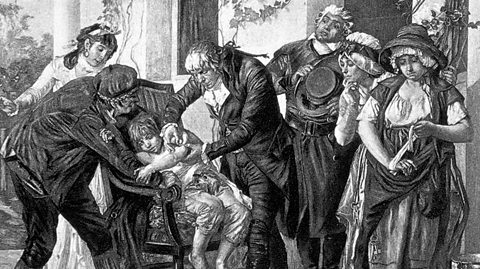
English scientist Edward Jenner (1749-1823) carried out important research into early vaccines. He is called the ‘father of immunology’ and his work is thought to have saved countless lives. Smallpox is a deadly disease that was common during Jenner’s lifetime. It killed between 10 and 20% of the population.
Jenner observed that people who milked cows were generally immune to smallpox. These workers caught cowpox from cows, and this gave them blisters. Jenner suggested that the pusThe thick yellow or green liquid produced during an infection. in the cowpox blisters protected them from smallpox. Cowpox is similar to smallpox but causes fewer deaths.
In 1798 Jenner tested his hypothesis by injecting an eight-year-old boy with the pus from cowpox. The boy fell ill but recovered. The boy was then immune to infection from smallpox. It took nearly two hundred years, but in 1980 the World Health Organisation declared smallpox to be eradicatedDestroyed completely..

Test your knowledge
Quiz
Test questions
Describe the similarities and differences between antibiotics and vaccines.
Tap 'Show answer' to see seven points you could have included.
- Both antibiotics and vaccines are medicines.
- Antibiotics only kill bacterial infections and do not work on viruses.
- Vaccines protect against viral and some bacterial infections.
- Antibiotics are taken when ill and vaccines are given before becoming ill.
- Antibiotics were discovered by Fleming and vaccines by Jenner.
- Antibiotics are substances found naturally in fungi which prevent them from being infected by bacteria.
- Vaccines are ‘dead’ or weakened versions of the virus which cause an immune response when given.
Describe how antibiotic-resistant bacteria are formed.
Tap 'Show answer' to see six points you could have included.
- Antibiotic-resistant bacteria are formed by evolution.
- Not all bacteria are killed if antibiotics are prescribed in a dose that is too low or for not long enough.
- Some of the remaining bacteria are now resistant to antibiotics.
- These antibiotic-resistant bacteria are not killed by further prescriptions of antibiotics.
- Antibiotic-resistant bacteria are therefore able to reproduce.
- Eventually, all bacteria become resistant to antibiotics.
GCSE exam dates 2025
Find out everything you need to know about the 2025 GCSE exams including dates, timetables and changes to exams to get your revision in shape.

More on Health and disease
Find out more by working through a topic
- count4 of 5
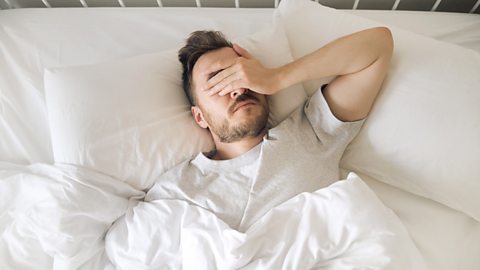
- count2 of 5
